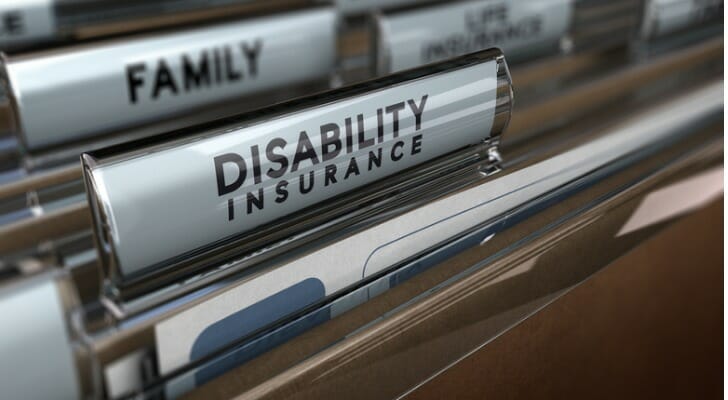Long-term disability insurance can replace lost income if an injury or illness prevents you from working for an extended period of time. Employers can offer long-term disability insurance through a group policy or you may be able to purchase a private policy on your own. Do I need long-term disability insurance? It’s an important question to ask and the answer can depend on your income, expenses, savings and how likely you are to need income replacement at some point. A financial advisor can help you figure out if and when long-term disability insurance makes sense for you.
What Is Long-Term Disability Insurance?
Long-term disability insurance replaces lost income for people who are unable to work for an extended period of time due to injury or illness. Typically, an extended period means three months or longer. Long-term disability insurance can also cover you in situations where you’re unable to return to work because of a permanent disability.
This is different from short-term disability insurance, which provides income replacement benefits for temporary injuries or illnesses. Long-term disability coverage isn’t the same as workers’ compensation or FMLA benefits either.
With workers’ compensation benefits, you can receive benefits if you’re out of work because of a work-related injury. So if you slip and fall at work and can’t work because of a broken leg, workers’ compensation would help to replace your income until you can get back on the job. FMLA benefits, proscribed by the Family Medical Leave Act, allow you to take up to 12 weeks of unpaid leave to care for a sick or injured family member.
How Long-Term Disability Insurance Works
Long-term disability insurance works by paying out benefits to you, based on the terms of the policy. Typically, long-term disability policies can pay a benefit equivalent to between 60% and 80% of your income. The policy may also make up any difference in income associated with having to change jobs because of an injury or illness if that new job pays less than your old one.
Benefits may be paid anywhere from one year up to 10 years, or until you reach a certain age. So depending on the extent of the injury or illness, you might be eligible to receive benefits up to age 65. There may be a waiting period you have to go through first before any benefits are paid after filing a claim. This waiting period can last anywhere from 30 days up to one year.
What Does Long-Term Disability Insurance Cover?
Long-term disability policies cover specific medical events that may keep someone from working for an extended period of time, usually longer than three months. What’s determined to be a “disability” is based on the policy but generally, it can include absences related to:
- Pregnancy and parental leave
- Cancer treatment
- Mental health issues or treatment
- Injuries
Long-term disability policies may make a distinction between conditions that would prevent you from doing your current job and those that might prevent you from doing any type of job or work for your employer. These policies can also include exclusions for events that are not covered. Exclusions typically include:
- Certain preexisting conditions
- Intentional injuries
- Injuries incurred during the commission of a crime
- Injuries that are the result of drug or alcohol use
- Any past injury that’s likely to recur
There are also certain events that may not be covered unless you purchase an additional rider to expand your policy. For example, vision or hearing loss or a loss of use of hands or feet may only be covered if you have a rider that includes those types of events.
How Much Long-Term Disability Insurance Costs

The cost of long-term disability coverage can vary from policy to policy. If you’re covered by a group policy at work, then you may have a very low out-of-pocket cost for premiums or pay nothing at all if your employer covers them in full.
In terms of what can influence long-term disability insurance costs, insurers consider these factors:
- Your age
- Gender
- Overall health
- Medical history
- Occupation
- Income replacement amount
- Length of time that benefits are paid
Some of the things that can make long-term disability insurance more affordable include being younger, in good health and having no preexisting injuries or health conditions. Choosing a lower income replacement amount or a shorter benefits payment term could also help to reduce your premiums.
You may be required to complete a health exam to apply for long-term disability insurance, though some companies do offer no-exam policies. The health exam is used to gauge your overall risk profile, based on how healthy you are and how likely you might be to develop an illness or experience an injury that might require you to file a claim.
Do I Need Long-Term Disability Insurance?
You might need long-term disability insurance if you’re concerned about the likelihood of being unable to work because of an injury or illness. Benefits from a long-term disability policy can be used to pay basic living expenses or medical bills so that you don’t have to dip into your emergency savings. And if you don’t have emergency savings at all, your policy can be an important stream of income until you can get back to work.
You may want to consider purchasing long-term disability coverage or participating in your employer’s cover if you:
- Are the primary breadwinner for your family
- Have no other sources of income outside your current job or self-employment
- Have limited financial resources (i.e. an emergency fund or investments) or want to avoid tapping into those resources if you’re unable to work
You may also consider purchasing a short-term disability policy to go along with long-term disability coverage. This way, you’re covered in a wider variety of situations where you may not be able to draw a paycheck because you’re out of work.
Other Important Questions to Ask Around Long-Term Disability Insurance
What Qualifies as a Long-Term Disability?
Long-term disability coverage applies to injuries or illnesses that keep you from working for more than three months. Pregnancy and parental leave, treatment for cancer and injuries that require a lengthy recovery period can all qualify for long-term disability benefits.
How Long Can You Collect Long-Term Disability Insurance?
Depending on how your policy is structured, you may be able to collect long-term disability benefits for as little as one year or as long as 10 years. Your policy may also pay benefits up to a specific age, depending on what type of coverage you have.
Is It Good to Have Long-Term Disability Insurance?
Long-term disability coverage can be good to have if you’re injured or develop a serious illness that keeps you out of work for a long period of time. These benefits can be used to cover medical expenses or pay day-to-day living expenses until you’re able to return to work.
What’s the Difference Between Long-Term Care Insurance and Disability Insurance?
Long-term care insurance is designed to cover your medical expenses if you require long-term care in a nursing facility. Disability insurance can replace lost income for the short- or long-term if you’re unable to work because of an injury or illness.
Bottom Line

Do I need long-term disability insurance? The answer may be yes if you want reassurance that you’ll have some type of income if you become ill or get hurt and can’t work for months at a time. Evaluating the costs of long-term care insurance if you don’t already have access to a plan at work and what you might be able to collect in benefits after filing a claim can help you decide if it’s worth having.
Insurance Planning Tips
- Consider talking to a financial advisor about whether it makes sense for you to have long-term disability insurance. Finding a qualified financial advisor doesn’t have to be hard. SmartAsset’s free tool matches you with up to three financial advisors who serve your area, and you can interview your advisor matches at no cost to decide which one is right for you. If you’re ready to find an advisor who can help you achieve your financial goals, get started now.
- When shopping for disability insurance, either short- or long-term, take time to compare quotes from different insurance companies. Also, consider whether a health exam is required for either type of policy. No-exam policies can allow you to sidestep the health exam but you might pay more in premiums.
Photo credit: ©iStock.com/kazuma seki, ©iStock.com/olm26250, ©iStock.com/Charday Penn
